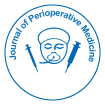
Journal of Perioperative Medicine
Open Access
ISSN: 2684-1290

ISSN: 2684-1290
Editorial - (2022)Volume 5, Issue 4
The Perioperative period is used to describe the three phases of any surgery which includes the preoperative phase , intraoperative phase and the postoperative phase.
The first phase, the preoperative phase starts with the decision of having surgery and ends with the beginning of surgery. This can be usually considered as preparative period as the goals of the surgery must be attained. During this period the mental state of the patient is also stabilized and the anxiety is reduced. Preoperative preparation of the patient includes a number of factors related to the avoidance of complications such as surgical site infections (SSI) and deep venous thrombosis (DVT).
The second phase, the intraoperative phase, involves the surgery itself. It starts with surgery and ends when the patient is shifted to the post-anesthesia care unit (PACU). During this phase, the patient is given some form of anesthesia, either general anesthesia or local anesthesia or regional anesthesia. As the surgery begins patients body conditions like heart rate, respiration, and blood oxygen, blood sugar level will be examined.
The final phase, the postoperative phase starts immediately after the surgey. Once the patient is ready to leave PACU and the poastoperative procedure starts. This stage is mainly focused on the patients physiological health and surgical recovery of the individual. It may include ensuring hydration, monitoring urination or bowel movements, assisting with mobility, providing appropriate nutrition, managing pain, and preventing infection.
Each surgical patient presents with his/her own unique set of risk factors and comorbidities. In addition to the risks of surgery and anesthesia common to all patients, every procedure that a surgeon performs carries its own set of specific management issues and potential complications.
There is no “standard” preoperative workup that fits all patients. Not every patient should be sent for the same set of tests such as laboratories, imaging, or other studies prior to surgery. Preoperative malnutrition increases the risk of complications after surgery, particularly related to wound healing and development of post-operative infections and increases length of stay.
Abuse of tobacco, alcohol, and illicit drugs is frequently identified in surgical patients. Although, ideally, all patients should be enrolled in smoking cessation or detoxification programs, this is clearly not possible in the preoperative setting. Smokers may suffer from postoperative nicotine withdrawal that requires treatment with nicotine replacement and may also have poor wound healing. Smoking cessation for at least 4 weeks preoperatively may mitigate the effects of smoking.
Published: 21-Jun-2021 , DOI: 10.35248/2684-1290.22.4.135
Copyright: This is an open access article distributed under the terms of the Creative Commons Attribution License, which permits unrestricted use, distribution, and reproduction in any medium, provided the original work is properly cited.